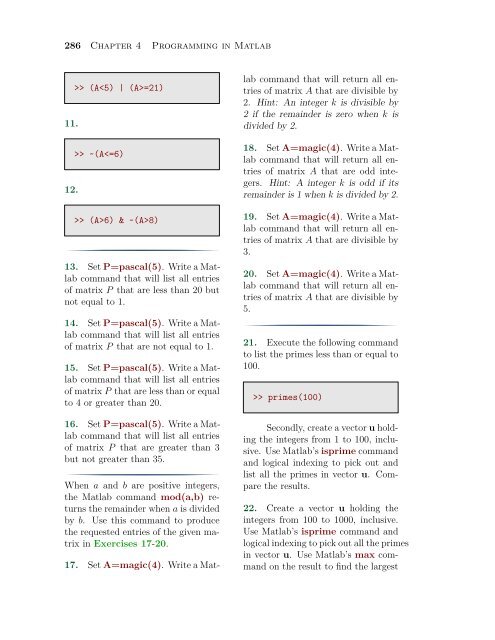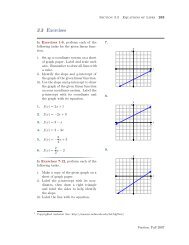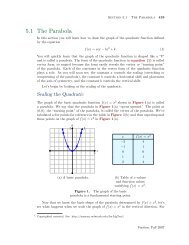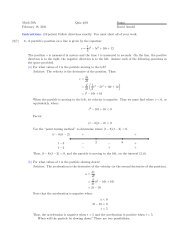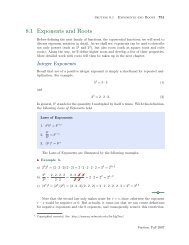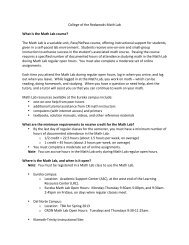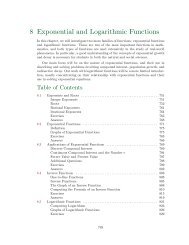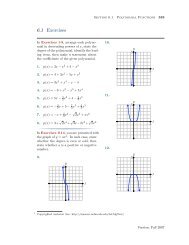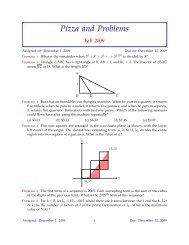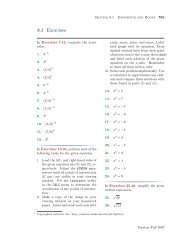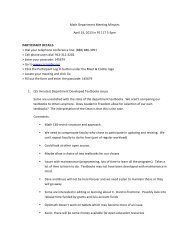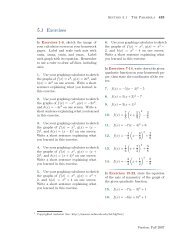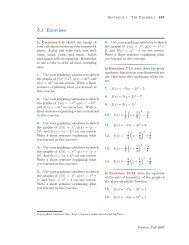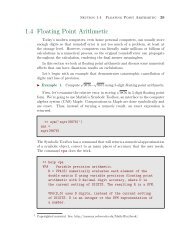Chapter 4: Programming in Matlab - College of the Redwoods
Chapter 4: Programming in Matlab - College of the Redwoods
Chapter 4: Programming in Matlab - College of the Redwoods
Create successful ePaper yourself
Turn your PDF publications into a flip-book with our unique Google optimized e-Paper software.
286 <strong>Chapter</strong> 4 <strong>Programm<strong>in</strong>g</strong> <strong>in</strong> <strong>Matlab</strong><br />
11.<br />
12.<br />
>> (A=21)<br />
>> ~(A> (A>6) & ~(A>8)<br />
13. Set P=pascal(5). Write a <strong>Matlab</strong><br />
command that will list all entries<br />
<strong>of</strong> matrix P that are less than 20 but<br />
not equal to 1.<br />
14. Set P=pascal(5). Write a <strong>Matlab</strong><br />
command that will list all entries<br />
<strong>of</strong> matrix P that are not equal to 1.<br />
15. Set P=pascal(5). Write a <strong>Matlab</strong><br />
command that will list all entries<br />
<strong>of</strong> matrix P that are less than or equal<br />
to 4 or greater than 20.<br />
16. Set P=pascal(5). Write a <strong>Matlab</strong><br />
command that will list all entries<br />
<strong>of</strong> matrix P that are greater than 3<br />
but not greater than 35.<br />
When a and b are positive <strong>in</strong>tegers,<br />
<strong>the</strong> <strong>Matlab</strong> command mod(a,b) returns<br />
<strong>the</strong> rema<strong>in</strong>der when a is divided<br />
by b. Use this command to produce<br />
<strong>the</strong> requested entries <strong>of</strong> <strong>the</strong> given matrix<br />
<strong>in</strong> Exercises 17-20.<br />
17. Set A=magic(4). Write a <strong>Matlab</strong><br />
command that will return all entries<br />
<strong>of</strong> matrix A that are divisible by<br />
2. H<strong>in</strong>t: An <strong>in</strong>teger k is divisible by<br />
2 if <strong>the</strong> rema<strong>in</strong>der is zero when k is<br />
divided by 2.<br />
18. Set A=magic(4). Write a <strong>Matlab</strong><br />
command that will return all entries<br />
<strong>of</strong> matrix A that are odd <strong>in</strong>tegers.<br />
H<strong>in</strong>t: A <strong>in</strong>teger k is odd if its<br />
rema<strong>in</strong>der is 1 when k is divided by 2.<br />
19. Set A=magic(4). Write a <strong>Matlab</strong><br />
command that will return all entries<br />
<strong>of</strong> matrix A that are divisible by<br />
3.<br />
20. Set A=magic(4). Write a <strong>Matlab</strong><br />
command that will return all entries<br />
<strong>of</strong> matrix A that are divisible by<br />
5.<br />
21. Execute <strong>the</strong> follow<strong>in</strong>g command<br />
to list <strong>the</strong> primes less than or equal to<br />
100.<br />
>> primes(100)<br />
Secondly, create a vector u hold<strong>in</strong>g<br />
<strong>the</strong> <strong>in</strong>tegers from 1 to 100, <strong>in</strong>clusive.<br />
Use <strong>Matlab</strong>’s isprime command<br />
and logical <strong>in</strong>dex<strong>in</strong>g to pick out and<br />
list all <strong>the</strong> primes <strong>in</strong> vector u. Compare<br />
<strong>the</strong> results.<br />
22. Create a vector u hold<strong>in</strong>g <strong>the</strong><br />
<strong>in</strong>tegers from 100 to 1000, <strong>in</strong>clusive.<br />
Use <strong>Matlab</strong>’s isprime command and<br />
logical <strong>in</strong>dex<strong>in</strong>g to pick out all <strong>the</strong> primes<br />
<strong>in</strong> vector u. Use <strong>Matlab</strong>’s max command<br />
on <strong>the</strong> result to f<strong>in</strong>d <strong>the</strong> largest


